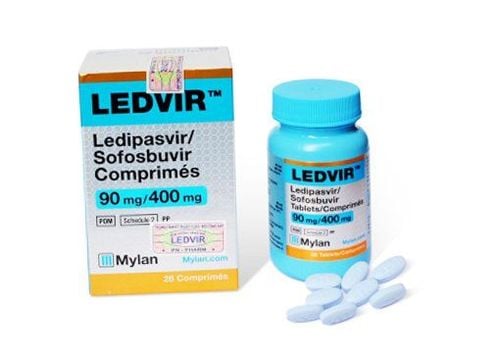This is an automatically translated article.
Ketaviran belongs to the group of antiparasitic, anti-infective, antiviral and antifungal drugs. It is indicated for the treatment of chronic active hepatitis B virus infection. Let's find out what Ketaviran drug is used for in a few articles below.
1. What is Ketaviran?
Ketaviran medicine contains 1mg of Entecavir and other excipients, just enough for 1 tablet. The drug is prepared in the form of tablets, a box of 3 blisters, each blister has 10 tablets.
2. What are the uses of Ketaviran?
Ketaviran is indicated for the treatment of the following conditions:
Chronic hepatitis B virus infection in adults with evidence of viral replication activity and or persistent elevation of serum aminotransferases (such as ALT or AST) or active tissue disease. In addition, the drug Ketaviran is contraindicated in the following cases:
The patient is allergic to the active ingredient Entecavir and other excipients contained in the drug's ingredients.
3. Dosage and how to take Ketaviran
Ketaviran drug is in the form of tablets, used orally. The drug should be taken with water and taken on an empty stomach (at least 2 hours after eating or 2 hours before eating).
The following is the dose for Ketaviran:
The recommended dose for adults and adolescents 16 years of age and older with chronic hepatitis B infection and not taking nucleotides is 0.5mg once daily. The recommended dose for adults and adolescents over 16 years of age with a history of hepatitis B infection while taking concomitant lamivudine or with lamivudine resistance mutations is 1 mg once daily. For patients with hepatic impairment : No adjustment of the daily dose is required. Note: The above dosage is only the recommended dosage. The treating doctor depends on the condition of each patient to prescribe the appropriate dose.
4. Ketaviran side effects
Doctors always consider between the benefits that Ketaviran brings to the patient and the possible risk of side effects to prescribe the appropriate medication.
Ketaviran is generally well tolerated, side effects are usually mild and transient, which usually resolves with discontinuation of treatment. Common side effects include:
Lactic acidosis and severe hepatomegaly, even fatal, have been reported when used alone or in combination with antiretroviral agents . Some patients with acute hepatitis B become worse when anti-hepatitis B therapy is discontinued. Patients should continue to closely monitor liver function both clinically and experimentally for at least several months in these patients. patients discontinue anti-hepatitis B therapy. Dose adjustment should be made in patients with creatinine clearance less than 50 mL/min, including patients on hemodialysis or continuous outpatient peritoneal dialysis. Liver transplant patients who have been taking an immunosuppressive drug that may affect kidney function, such as cyclosporin or tacrolimus, should have their kidney function checked before and during treatment with Ketaviran. If these symptoms occur, the patient should stop using Medinpacol and notify the doctor for appropriate treatment.
5. Ketaviran drug interactions
It is necessary to list drugs such as prescription drugs, over-the-counter drugs, functional foods, herbs, ... the patient is using for the doctor to know and give specific advice.
Some drug interactions when used in combination with Ketaviran include:
Ketaviran is eliminated mainly by the kidneys, so the combination with drugs that reduce kidney function or compete for active excretion with the drug. Tubular ketaviran may increase serum or co-administered drug concentrations. Co-administration of Ketaviran with lamivudine, adefovir dipivoxil or tenofovir disoproxil fumarate did not result in significant drug interactions. Consequences of the co-administration of these drugs have the potential to affect renal function, so patients should be closely monitored for adverse effects of these drugs when co-administered. To avoid interactions, before being prescribed Ketaviran, the patient should inform the doctor about the drugs they are using, including dietary supplements. The doctor will base on that to prescribe the appropriate Ketaviran.
6. Some notes when taking Ketaviran
Only use the drug for pregnant and lactating women unless specifically directed by a doctor, after considering the benefit of the drug and the potential risk that may occur on the fetus and breastfed babies. When a dose of Ketaviran is forgotten, the patient should take it as soon as he remembers, the drug can also be taken 1-2 hours before the usual time of taking the medicine. However, the patient should skip the missed dose if it is almost time for the next dose and do not double the dose if the patient forgets to take Ketaviran. In the event of an overdose of Ketaviran, the patient should immediately stop taking the drug and notify the doctor. Immediately take the patient to the nearest hospital when the condition worsens. In severe cases, induce vomiting or gastric lavage to remove the drug from the body. Above is information about uses, dosage and precautions when using Ketaviran. To ensure safety for health and maximize the effectiveness of treatment, patients need to take Ketaviran medicine exactly as directed by the doctor. Note, Ketaviran is a prescription drug, and patients absolutely must not use it without a prescription from a specialist.













